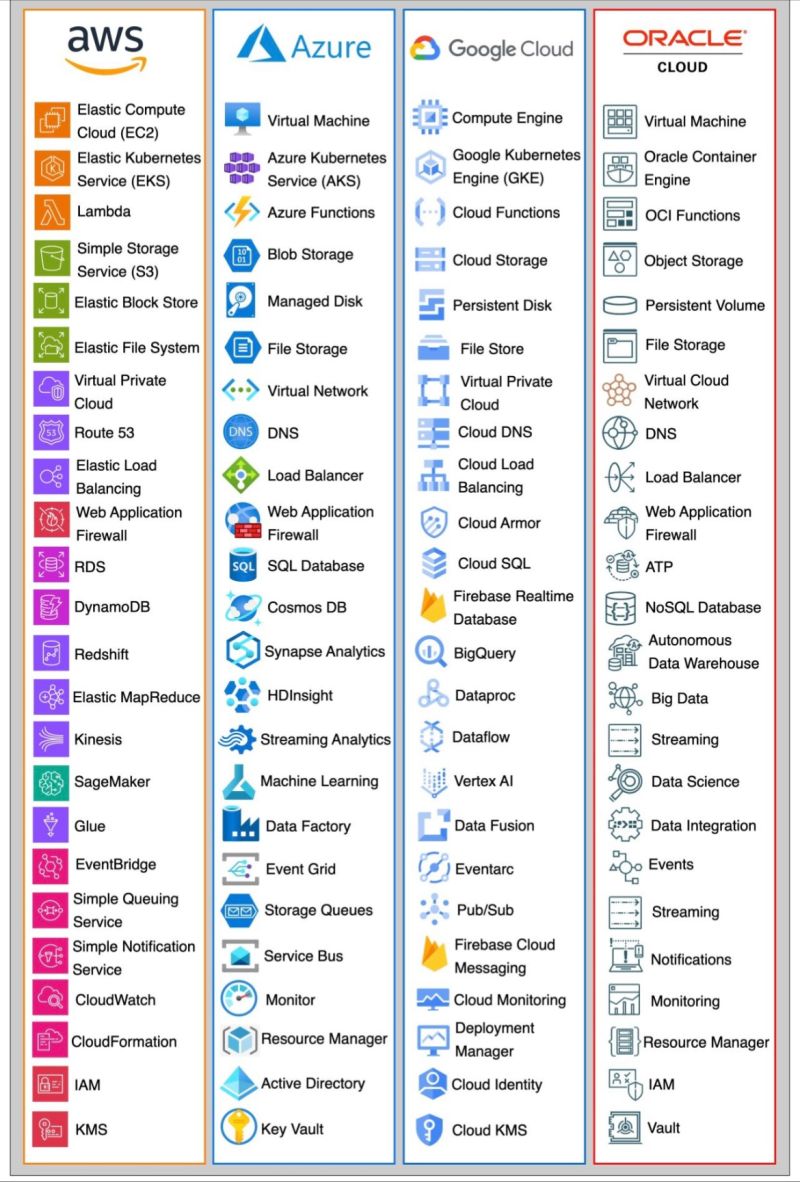July 1, 2023
Introduction
In today’s digital era, businesses are increasingly adopting cloud computing to scale their operations, enhance flexibility, and reduce costs. Among the major cloud service providers, Amazon Web Services (AWS), Microsoft Azure, Google Cloud, and Oracle Cloud have emerged as dominant players in the market. Each offers a comprehensive cloud technology stack tailored to meet different business needs. In this blog, we’ll conduct a thorough comparison of these leading cloud technology stacks to help you make an informed decision when choosing the best-fit cloud provider for your organization.

AWS (Amazon Web Services)
Amazon Web Services, launched in 2006, has been a pioneer in cloud computing and holds the largest share of the cloud market. AWS provides a wide range of cloud services, including computing power, storage options, networking capabilities, and machine learning services. Some key features of AWS include:
- Scalability: AWS offers auto-scaling and load balancing features, allowing businesses to easily handle fluctuations in demand.
- Global Reach: With data centers located in multiple regions across the globe, AWS ensures low-latency access to services for customers worldwide.
- Cost Management: AWS offers a pay-as-you-go pricing model, allowing businesses to control costs effectively.
- Vast Service Catalog: From Amazon EC2 for virtual machines to Amazon S3 for storage and Amazon RDS for databases, AWS offers a comprehensive range of services to cater to diverse business needs.
Azure (Microsoft Azure)
Microsoft Azure, launched in 2010, is a robust cloud platform that provides a vast array of services and integration with Microsoft’s software ecosystem. Some key features of Azure include:
- Hybrid Capabilities: Azure offers seamless integration between on-premises infrastructure and the cloud, making it an excellent choice for hybrid cloud deployments.
- Enterprise Focus: With a strong focus on enterprise-grade security and compliance, Azure is widely adopted in industries with strict regulatory requirements.
- Azure Active Directory (AD): Azure AD provides identity and access management services, making it easy for organizations to manage user identities and access to resources.
- AI and Machine Learning: Azure offers a rich set of AI and machine learning services, empowering businesses to build intelligent applications.
Google Cloud
Google Cloud, introduced in 2011, leverages Google’s extensive experience in managing large-scale infrastructure and data centers. Some key features of Google Cloud include:
- Data Analytics: Google Cloud excels in data analytics, offering services like BigQuery, Dataflow, and Data Studio for processing and visualizing large datasets.
- Machine Learning Expertise: Google Cloud’s AI/ML offerings, including TensorFlow and AI Platform, are widely acclaimed for their capabilities in building sophisticated machine learning models.
- Global Network: With one of the most extensive global networks, Google Cloud ensures reliable and low-latency access to services from anywhere in the world.
- Kubernetes Integration: Google Cloud offers strong support for Kubernetes, making it a preferred choice for containerized applications.
Oracle Cloud
Oracle Cloud, launched in 2016, is an integrated cloud platform that provides a comprehensive suite of cloud services. Some key features of Oracle Cloud include:
- Enterprise Applications: Oracle Cloud focuses on providing integrated cloud solutions for enterprise applications, including ERP, HCM, and CX.
- Autonomous Database: Oracle’s Autonomous Database technology automates many routine database management tasks, reducing human intervention and improving reliability.
- High-Performance Computing: Oracle Cloud is equipped with high-performance computing capabilities, suitable for data-intensive workloads.
- Dedicated Regions: Oracle Cloud offers dedicated regions to meet specific data residency and compliance requirements.
Conclusion
When comparing the leading cloud technology stacks of AWS, Azure, Google Cloud, and Oracle Cloud, there is no one-size-fits-all solution. Each cloud provider brings unique strengths to the table, and the right choice depends on your organization’s specific requirements, such as scalability, performance, security, budget, and existing infrastructure. Careful consideration of your business needs and a thorough evaluation of each cloud provider’s services will help you select the best-fit cloud technology stack for your organization’s success in the cloud.

